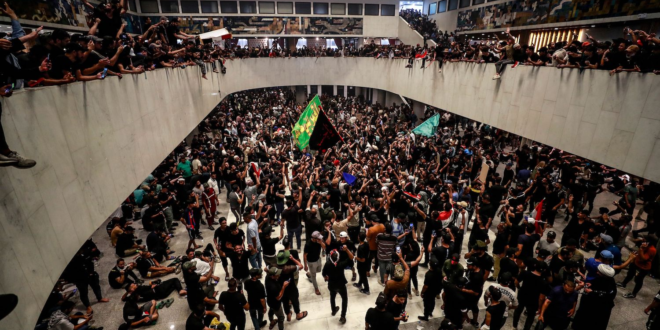Deadly clashes flared in Iraq on Monday after hundreds of people stormed its government palace, an ominous turn of events that has plunged the country even deeper into political turmoil.
The protesters, fiercely loyal supporters of the influential Shiite cleric Moqtada al-Sadr, had been enraged by his pledge to leave Iraqi politics—although he has made similar vows before and failed to follow through on them. Some experts say Sadr’s announcement was a dangerous, desperate ploy to maintain his power and galvanize his base.
“[Sadr] doesn’t have any leverage right now, so what he is doing is appealing to the emotions of his followers who are the closest you can get to a personal cult,” said Abbas Kadhim, director of the Atlantic Council’s Iraq Initiative.
“He is telling his followers that, ‘Okay, I was defeated, but it’s up to you to turn me into a victorious player by doing whatever it takes. Or you could say, we give up, we lost,’” Kadhim added. “These people are willing to do anything.”
At the heart of the crisis is a political deadlock that has paralyzed Iraq’s governmental processes and deepened internal rifts since the country’s October elections, all under the specter of Iranian influence. Although Sadr was the elections’ biggest victor, he was unable to negotiate a new government after excluding rival Shia leaders. That pitched Iraq into uncertainty and left it in the hands of a caretaker government that can’t approve budgets or legislation.
As Iraq remained locked in a stalemate in June, Sadr ordered the resignations of the 73 members of parliament loyal to him. It did not go as he may have intended: They were swiftly replaced, effectively eliminating his parliamentary sway for the first time in nearly two decades.
“Sadr anticipated that his rivals … would repair this situation by going to him, begging him to change his mind and bring his MPs back,” said Kadhim. “But they did not. They called his bluff and went ahead and used the law to replace Sadr’s MPs with their own.”
Since July, hundreds of Sadr’s supporters have been camped out inside the parliament building in order to disrupt rivals’ political efforts. But Monday’s clashes—which killed at least fifteen people, injured over 100, and pushed the military to impose a nationwide curfew—suggest a worrying new turn in the crisis.
Sadr’s ultimate goal is “to stir the nation and hijack popular sentiment to become the most powerful man in Iraq,” as Shayan Talabany argued in Foreign Policy earlier this month.
That suggests that the country’s crisis could worsen before it shows any signs of reprieve. “Sadr’s willingness to worsen Iraq’s political turmoil, delay Iraq’s government formation, and escalate protests further—threatening an all-out war with rival Shiite groups—should surely serve as a warning that he is capable of catapulting the country into something even worse,” Talabany wrote.
 Eurasia Press & News
Eurasia Press & News




